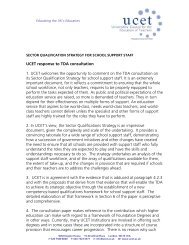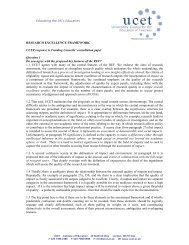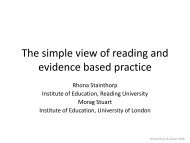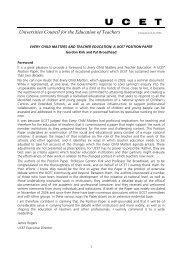The School Curriculum Ten Years Hence - UCET: Universities ...
The School Curriculum Ten Years Hence - UCET: Universities ...
The School Curriculum Ten Years Hence - UCET: Universities ...
Create successful ePaper yourself
Turn your PDF publications into a flip-book with our unique Google optimized e-Paper software.
ensure that such an approach is not perceived as a ‘dumping<br />
ground’ or as a ‘perverse incentive’.<br />
• Acceptance that it is possible to re-engage some young people in<br />
school and within the school curriculum. For others re-engagement<br />
will mean involvement in a partnership exercise, perhaps in a FE<br />
college or training organisation. For others re-engagement may be<br />
back into society through a community initiative<br />
• Understanding that early intervention ‘pays off’ - it is equally<br />
important to use resources for Year one Nurture Units for the four<br />
year old as for Alternative Education Provision for the 16-year-old.<br />
We need to appreciate that social inclusion is much more than a<br />
funding issue.<br />
• Understanding that the problems of disengagement do not always<br />
spring from deep-seated resentment with the school or the<br />
curriculum. <strong>The</strong> 25/0 ‘Warnock’ group, the 10/0 of KS4 pupils<br />
referred to the Education and Library Boards include young carers,<br />
those who may have suffered a bereavement, may be enduring a<br />
family break-up, may have a parent made unemployed, or are<br />
trying to cope with bullying or peer pressure. Such pupils require<br />
individual pastoral support and it is the duty and the privilege of the<br />
teacher to help provide such support, in person or at second-hand.<br />
Teacher education, at initial, early and continuing professional<br />
development has a vital role to play in ensuring beginning and<br />
experienced teachers keep such issues to the forefront. As a former<br />
teacher educator I am conscious that my last statement can be<br />
seen as yet another priority that teacher education has to address. I<br />
do believe, however, that the integrated nature of our provision in<br />
Northern Ireland (already referred to) provides a good model for<br />
continuous professional development, involving the many who have<br />
a growing expertise in this field.<br />
<strong>The</strong>re is a specific need for teacher education wherever that occurs:<br />
• To examine the relevance to the learner of the curriculum and the<br />
teaching approach used. In terms of the teaching approach much<br />
could be gained from the application of the approaches of Youth<br />
work which aims to help young people shape and develop their own<br />
experiences, and to participate in decision making on matters that<br />
affect them.<br />
• To be familiar with the provision of recent relevant up-to-date<br />
materials and development training courses.<br />
• To be aware of the availability of high-quality general guidance. I<br />
believe such guidance exists for Northern Ireland schools through:<br />
• <strong>The</strong> Department of Education’s Circular 1999/10, Pastoral Care<br />
• Promoting Positive Behaviour<br />
• Evaluating Pastoral Care<br />
• <strong>The</strong> provision of more specialised counselling support - as a<br />
service available for all.<br />
• Training in how to cope with the ‘hard-to-help’ young person. For






